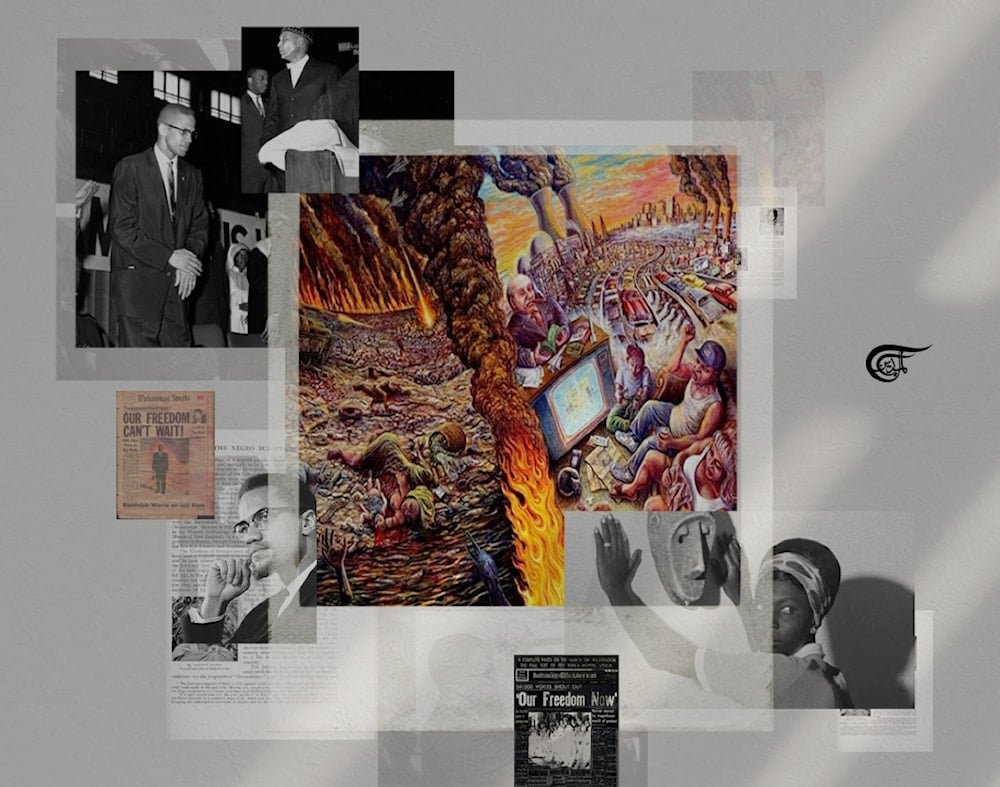Black Originism versus globalized Kali-Yuga negrophobia
Farafin Kissi Shabazz links modern anti-Blackness to a deeper civilizational decay, a spiritual crisis that can only be overcome through a Pan-African renaissance rooted in primordial Black wisdom.
-

Overcoming the modern Kali Yuga requires a civilizational renaissance based not only on the mental and cultural decolonization of Black peoples, but also on their physical and metaphysical unity. (Al Mayadeen English; Illustrated by Batoul Chamas)
In the era of neoliberal globalism, the phenomena of racial discrimination and marginalization of Black peoples are taking on a global dimension. This dynamic, which can be described as globalized negrophobia, is not limited to the socioeconomic dimension but is rooted in a deeper crisis: that of humanity's spiritual and civilizational values. From this perspective, globalized modernity can be compared to the Iron Age (Kali Yuga in Hindu tradition), a symbolic concept designating the period of obscuration of sacred knowledge and the predominance of materialism. As René Guénon observes, the Kingdom of Quantity represents the culmination of this process of dissolution.
The Original Man
Afrocentric thought considers Black people as the original people, custodians of sacred knowledge and civilization. In the 1930s, Elijah Muhammad (1897–1975), leader of the Nation of Islam, was one of the first to champion the idea that Black people were the original people and the creators of civilization. Following the example of thinkers such as Marcus Garvey and Noble Drew Ali, he proposed a theological and historical reinterpretation of the centrality of Africa in the genesis of humanity.
His theories were taken up and developed by Malcolm X and Khalid Abdul Muhammad, who introduced the discourse on Black identity into the political-militant context of liberation and pan-African self-determination. At the same time, in the academic world, researchers such as Cheikh Anta Diop, Chancellor Williams, Runoko Rashidi (whom I knew during her lifetime), Frances Cress Welsing, Ivan Van Sertima, Amos Nelson Wilson, Leonard Jeffries, Asa Grant Hiliard III, Clyde Winters, Yosef Ben Jochannan, John Henrik Clarke, Théophile Obenga, Jean Charles Coovi Gomez, James Small, and my friend, brother Abdul Karim Assahly, have contributed pioneering work to the rewriting of classical African and diaspora history.
Negrophobia, symbol of anti-Tradition
Negrophobia cannot be considered merely a form of structural racism; it is also an expression of anti-Tradition, that is, a hostility toward Primordiality and transcendence. From a Guénonian perspective, modernity denies the metaphysical and spiritual principle, replacing it with a purely material and quantitative order. In this sense, hatred toward Black peoples reflects the modern world's aversion to what they symbolically represent: the connection to origin, the sacredness of ancestral nature, and the unity of being (I explore this topic in more detail in a manuscript of mine).
Far from annihilating Black people, contemporary globalized negrophobia paradoxically contributes to reviving a deeper self-awareness and what I call "Negricity" (pride in our eumelanin). Globalized negrophobia is not just a remnant of colonialism or a geopolitical move of domination; it is also a symptom of the crisis of the modern world. In traditional terms, it is an expression of the Kali Yuga: the age of spiritual degeneration and the departure from Primordiality. Yet, in the depths of this modern degeneration lie the seeds of rebirth for a return to the Golden Age (the Zep Tepi).
Black Originism: Self-Determination and imperial Pan-African Renaissance
Overcoming the modern Kali Yuga requires a civilizational renaissance based not only on the mental and cultural decolonization of Black peoples, but also on their physical and metaphysical unity. Revolutionary Pan-Africanism, in the vision of the late Khalid Abdul Muhammad, aimed to reconstitute an autonomous political and spiritual order: "The Black world as a kingdom, Africa as a throne, God as a crown."
Africans must push for the construction of what I call the "Melanodermic Empire," symbolic and concrete, capable of uniting Black people on the continent and in the diaspora. Only by restoring a power in Africa that will counter the dark night of modernity can Africans and Afro-descendants be respected. This power can be restored through what I call "Black Originism" (or Black Primordialism), the spiritual and philosophical path that must lead the African people back to their primordial essence.
Further reading:
-R. Guénon, Il regno della quantità e i segni dei tempi, Adelphi, Milano 1982.
-E. Muhammad, Message to the Blackman in America, Muhammad’s Temple No. 2, Chicago 1965.
-C.A. Diop, Civilisation ou barbarie: anthropologie sans complaisance, Présence Africaine, Paris 1981.
-C. Williams, The Destruction of Black Civilization, Third World Press, Chicago 1971.
-R. Rashidi, Introduction to the Study of African Classical Civilizations, 2013.
-Clarke, J. H., African People in World History, Black Classic Press, 1993.
-Diop, C. A., The African Origin of Civilization: Myth or Reality, Lawrence Hill Books, 1974.
-R. Guénon, La crise du monde moderne, Gallimard, 1946.
-Rashidi, R., African Star over Asia: The Black Presence in the East, 2012.
-Welsing, F. C., The Isis Papers: The Keys to the Colors, Third World Press, 1991.
-Williams, C., The Destruction of Black Civilization, 1971.

 Farafin Kissi Shabazz
Farafin Kissi Shabazz
 5 Min Read
5 Min Read







